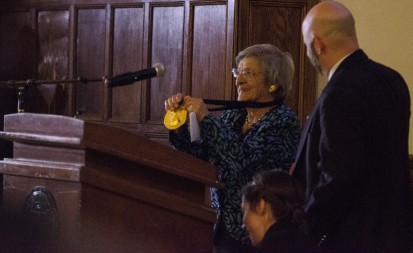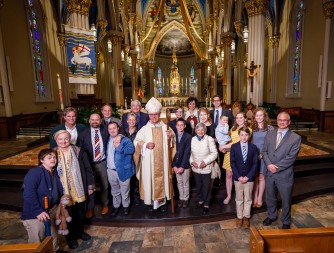May 2, 2017 // Special
Jerome Lejeune Foundation receives Evangelium Vitae Medal
Special guests at the April 29 presentation of the Evangelium Vitae Medal to the Jerome Lejeune Foundation included a former ambassador, major donors, a priest celebrating the 17th anniversary of his ordination and the founder of the Notre Dame William P. and Hazel B. White Center for Ethics and Culture. However, the guests of honor were those Dr. Lejeune affectionately called his “little ones:” people living with Trisomy 21, more commonly known as Down Syndrome.
These special guests ranged from infants to Down Syndrome adult David DeSanctis, who proudly introduced himself as a movie star because of his role in “Where Hope Grows.” O. Carter Snead, director of the Center for Ethics and Culture, commended these guests’ “gift of self, the beautiful ways they enrich all of our lives.”
When the French physician began seeing patients like these in his country, “mongolism” as Down Syndrome was called at the time, was widely believed to be contagious and the result of the mother’s syphilis. By discovering in 1958 that it’s actually the result of an extra, 21st chromosome, Dr. Lejeune became the founder of modern genetics. More important to him, his discovery enabled families to shed their shame and help their beloved children live a fuller life. One of his patients gave this powerful testimony at his funeral: “Because of you, I’m proud of myself.”

Birthe Lejeune, widow of Dr. Jerome Lejeune, accepts the Evangelium Vitae Medal from the Notre Dame Center for Ethics and Culture. The Jerome Lejeune Foundation was established in 1996, having grown out of Lejeune’s pioneering work in genetics and lifetime of care and advocacy on behalf of those with intellectual disabilities, born and unborn.
Even though he was the father of five children, the humble Lejeune was always available to his precious patients and their families — 9,000 of them. One of his disappointments, however, was not to be able to find an ethical way to repair the genetic abnormality during his lifetime.

Bishop Kevin Rhoades poses with representatives of the Jerome Lejeune Foundation and the Notre Dame Center for Ethics and Culture following a Mass at the Basilica of the Sacred Heart, on Saturday, April 29.
A faithful son of the Catholic church and close friend of St. John Paul II, he was named President of the new Pontifical Academy for Life only a month before his death on Easter 1994.
Dr. Lejeune was deeply grieved when his discovery began to be utilized as a test that contributed to the abortion of countless human beings prenatally diagnosed with Trisomy 21. His strong pro-life stance also hurt his professional career and the respect of many peers. In 2012 he was recognized as a “Servant of God,” however, and many people pray for his beatification.
Bishop Kevin C. Rhoades began the evening’s events by celebrating a Saturday vigil Mass at Notre Dame’s Basilica of the Sacred Heart. In his homily, he called the Jerome Lejeune Foundation “a powerful witness to the joy and hope of the Gospel, the Gospel of life, a group which is living the mission of bringing the hope of the Gospel to our society and culture.” Just as the disciples on the road to Emmaus came to recognize Jesus in the breaking of the bread, “may we recognize His presence in children with Down Syndrome, both born and unborn,” he said.
At the banquet that followed, Dr. Pilar Calva from the Pontifical University of Mexico recalled her internship under Dr. Lejeune, who helped her learn to treat people rather than illnesses. He led her to understand that faith couldn’t be left at the church door on Sunday, she said, but that a Christian must wear a cross and a white coat at the same time.
According to the award citation, “The Foundation is the largest sponsor of ethically conducted genetic research in France today: In the last 20 years, it has funded 570 research projects in more than 18 countries across the globe, dedicated
to better understanding and treating a variety of genetic disorders. … “Perhaps most importantly, the Jerome Lejeune Foundation continues to speak out on behalf of society’s disinherited via public advocacy that helps the world to see with the eyes of Professor Lejeune, to love with his radical hospitality, to appreciate the beauty in our differences—and above all, to recognize in each unique individual the reflection of the Creator, which unites us all with equal dignity.”
After the citation was read, Lejeune’s widow, Birthe, accepted the medal on behalf of the foundation.
“I’m proud and happy to be here,” she said, blowing kisses to the crowd. She admitted that it’s very difficult to be pro-life in France today.
Thierry de la Villejegu, executive director of the foundation, also spoke briefly. With the $10,000 Evangelium Vitae award, he said, the foundation hopes to establish a clinic like the Jerome Lejeune Institute in the United States so that people with Trisomy 21 can have “a much better life.” He pointed out that the most important task of Catholics isn’t medical or scientific but the work of changing hearts and minds to “defend the dignity of the human being, especially the weakest among us. It is they who enable all of us to be most fully ourselves.”
The Notre Dame Center for Ethics and Culture believes that the truth the church affirms about the human person is the foundation for freedom, justice, human dignity and the common good. It’s mission statement is “to share the richness of the Catholic moral and intellectual tradition through teaching, research and dialogue, at the highest level and across a range of disciplines.” Every year on Respect Life Sunday the center announces a new recipient of the Evangelium Vitae award, “the nation’s most important lifetime achievement award for heroes of the pro-life movement, honoring individuals whose efforts have served to proclaim the Gospel of Life by steadfastly affirming and defending the sanctity of human life from its earliest stages.” The Jerome Lejeune Foundation is the seventh medal recipient.
The best news. Delivered to your inbox.
Subscribe to our mailing list today.






